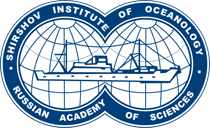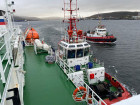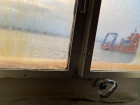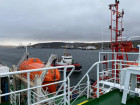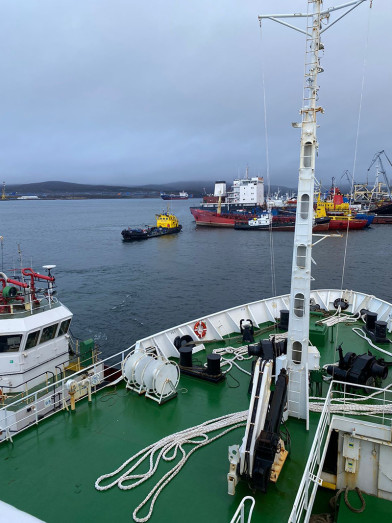 The towing of RV Akademik Nikolay Strakhov, whose main engine failed in the Kara Sea on September 5, has been successfully completed. The rescue tug Murman safely delivered the damaged vessel with the crew and scientific staff on board to the port of Murmansk.
The towing of RV Akademik Nikolay Strakhov, whose main engine failed in the Kara Sea on September 5, has been successfully completed. The rescue tug Murman safely delivered the damaged vessel with the crew and scientific staff on board to the port of Murmansk.
On behalf of the management of the Institute of Oceanology of the Russian Academy of Sciences, Deputy Director of the Institute of Oceanology of RAS for scientific work Vyacheslav Kremenetsky and Deputy Director for the fleet - Head of the Center for Marine Expeditionary Research, Head of the Center for Collective Use "Scientific Fleet of the Institute of Oceanology of the Russian Academy of Sciences" Denis Zlygostev are coming in Murmansk for the arrival of the "Akademik Strakhov".
RV Akademik Strakhov set out on its 58th voyage on August 29. During the expedition, scientists planned to carry out comprehensive geological, geophysical, geomorphological and hydrophysical studies on the Barents-Kara shelf and in the Laptev Sea. The expedition also aimed to study the relief of the seabed and analyze natural risks in the seas of the Arctic zone of Russia, including along the Northern Sea Route.
After one of the main engine cylinders failed, the vessel was immobilized, anchored near Bely Island in the Kara Sea. After the crew attempted to fix the problem on their own and the IO RAS management implemented a number of measures that were unsuccessful, including organizing the towing of the vessel to nearby ports in the Gulf of Ob, evacuating people to the R/V Akademik Mstislav Keldysh, it was decided to tow the research vessel using the multifunctional emergency rescue vessel Murman of the Marine Rescue Service. The evacuation of people to the rescue tugboat, which approached the accident site on September 19, did not take place due to unfavorable weather conditions. The Murman took the Strakhova in tow with the entire crew and scientific staff on board.
"During this entire time, the situation with the RV Akademik Nikolay Strakhov was under 24-hour control of the IO RAS management, reports from the vessel were transmitted to the Marine Rescue Service every 4 hours. Life support systems and emergency diesel generators were operating normally, there was no threat to the lives and health of people," Denis Zlygostev noted.
"We are glad that the rescue operation has successfully come to an end and our colleagues will soon be heading home. For our part, we will have to find out the circumstances of what happened and establish the cause of the breakdown," Vyacheslav Kremenetsky concluded.
